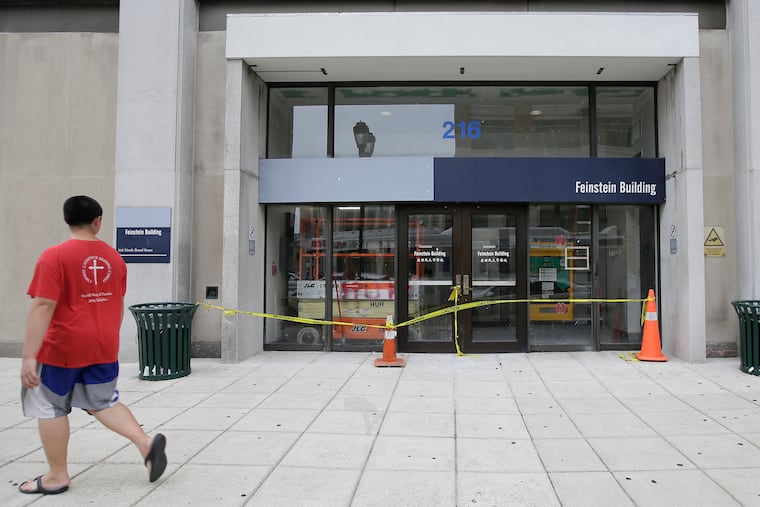Can Philly use eminent domain to take over Hahnemann hospital for coronavirus patients?
Philadelphia has the authority to seize the former Hahnemann hospital by eminent domain. But that would mean the city has to buy it.

Update: Mayor Jim Kenney on Thursday said the city has ended negotiations to use the former hospital and will instead pursue other facilities.
As Philadelphia officials negotiate to use the former Hahnemann University Hospital as quarantine or isolation space during the coronavirus pandemic, City Councilmember Helen Gym is calling for the city to consider seizing the property by eminent domain.
“My belief is that the city has the right to exercise some authority here and should be exploring all possible options,” Gym said Wednesday.
Gym’s remarks came after Mayor Jim Kenney accused California businessman Joel Freedman — who is seeking about $1 million a month to use the facility — of “jacking up monthly prices” to profit from the coronavirus crisis.
The city or state would have the power to use eminent domain, through which the government can take ownership of property that is needed for public use.
But it was unclear whether it would be in the city’s economic interest to take such a step, since state law requires paying “fair market value” to a landlord whose property is condemned. Managing Director Brian Abernathy has said the city has no interest in purchasing the property.
“We are working with the law department on multiple fronts to see if there are other options” beyond eminent domain, Abernathy said at a news conference Wednesday.
Whether the city can benefit from using eminent domain may depend on whether it’s able to seize the temporary use of the property — such as through a lease — rather than having to buy the property outright.
“It’s hard to imagine a situation that provides a better argument for public use than this one,” said Amy Sinden, a professor at Temple University’s Beasley School of Law. "The city’s hesitation here comes from the ‘just-compensation’ piece.”
But George Kroculick, an attorney specializing in eminent domain cases at law firm Duane Morris in Philadelphia, said the practice does not require public bodies to take ownership of property that they condemn.
“Condemnation does not require taking all property rights,” he said. “It could also mean that the condemnor takes something less than an entire property. It could take, for example, an easement. It could condemn a lease.”
Still, city officials said they hope negotiations will allow them to use the building temporarily rather than purchase it.
The hospital closed last year after its owner, American Academic Health System, filed for bankruptcy. Freedman retained ownership of the property.
Although a city spokesperson said Tuesday that the building could be used for hospital space if the city has a surge in COVID-19 patients, Abernathy clarified Wednesday that it would not become a functioning hospital. It is completely empty and needs significant work to be used again, he said.
“We do think it could be useful either for isolation or quarantine space or potentially a receiving area for hospitals as patients get well enough to leave hospitals," Abernathy said. “I don’t want to imply that this is going to be an operating hospital again because I don’t think that is likely.”
City officials said Tuesday that Freedman is seeking about $400,000 in rent in addition to operating costs, for a total of about $1 million per month for six months.
“Given the current needs, we’re certainly willing to cover the owner’s operating expenses but don’t feel that we should be paying rent for what otherwise would be a vacant building especially given the urgent and critical needs that the city is facing,” Abernathy said. “We have not heard back from Mr. Freedman on his posture based on that negotiation.”
Sam Singer, a spokesperson for Freedman, said the proposed rates were based on a price per hospital bed, plus estimated operating costs, totaling a daily cost of $60 per bed, or about $910,000 per month. Although the facility does not currently have beds any inside, Singer said those calculations were based on its 500-bed capacity.
“If the city wants the property, we’ll sell it to them at fair market value," Singer said Wednesday. “That would be the same as eminent domain."
Other City Council members weighed in Wednesday, criticizing Freedman over the negotiations. Councilmember Maria Quiñones Sánchez said the city should look into other facilities, such as the Pennsylvania Convention Center in Center City.
Abernathy said that the city is having discussions with “multiple sites” to handle a potential surge coronavirus cases,
“The convention center could be one site but there are a number of other sites across the city that we are talking to as well,” he said.
The city has negotiated a lease to use the Holiday Inn Express at 13th and Walnut Streets as a quarantine space for the city’s homeless population or people who cannot quarantine in their own homes. Abernathy declined to say how much the city is paying for the space.
But Gym said she would still like the city reclaim the former Hahnemann hospital.
“I think it would be obscene ... in the middle of health pandemic, in the middle of a public health emergency, to have a hospital that sits empty,” Gym said.